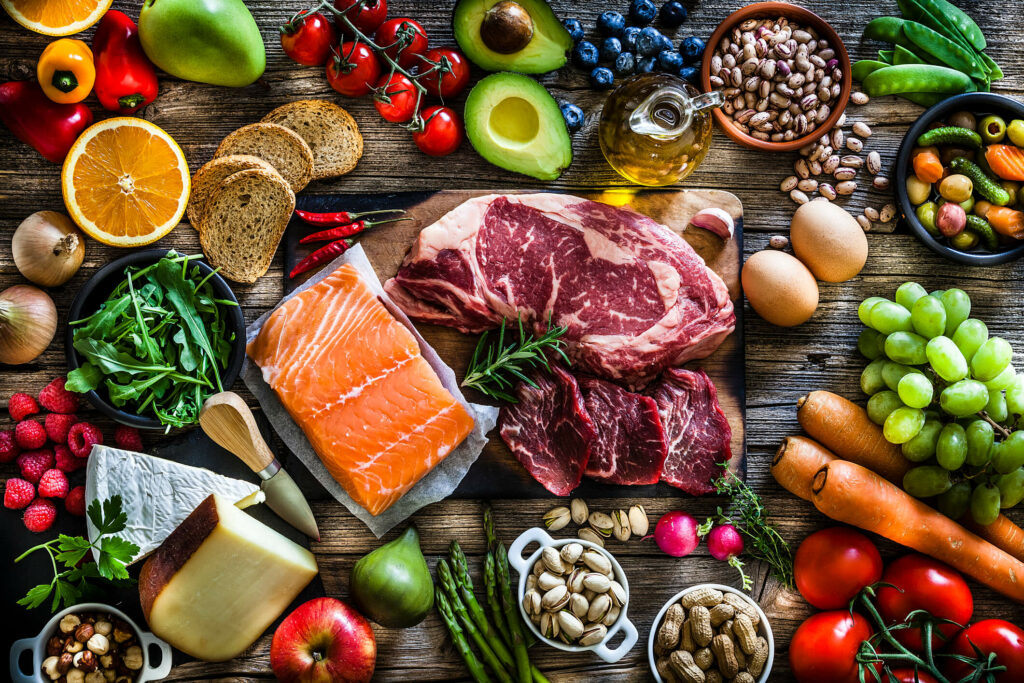Protein is a major nutrition source in the human body and plays a primary role in regulating cellular functions. It is found in every body part and tissue including the muscle, bone, skin, and hair. So, protein intake is very important. According to studies, between 10% and 35% of total calories should come from protein sources. This value changes for each person depending on factors like health, body composition, activity level, and so on.
So, the amount of protein each individual differs and is something that you should take note of. Well, let us look at how much protein you should take daily for maintaining overall health and wellness.
Standard Protein Intake
The National Academy of Medicine has stated that the Recommended Dietary Allowance (RDA) for protein is 0.8 for every kilogram of body weight per day or 7 g for every 20 pounds of body weight to remain fit and healthy. For example, a 140 pounds person should take 50 g of protein each day and a 200 pounds person should consume 70 g of protein each day.

Based on studies, here are the estimated protein requirement for each age category:
- Babies require around 10 g of protein per day
- School-going kids should take 19 to 34 g of protein each day
- Teenage boys have to take up to 55 g of protein a day
- Teenage girls should have 46 g per day
- For adults, the percentage depends on body weight as stated before
Protein- Health Benefits
Here are the main health benefits that you can expect from a proper intake of protein per day:
- Reduces Appetite and Hunger- Scientific studies show that protein intake provides the feeling of fullness because it reduces the levels of the hunger hormone, ghrelin. Protein is also known to increase the peptide YY which gives the feeling of fullness.
- Elevates Muscle Mass and Strength- Protein is essential for maintaining healthy muscles. Taking adequate amounts of protein every day will help increase muscle mass and boost muscle growth. Proper protein intake also helps prevent muscle loss during weight loss.
- Enhances Bone Strength- Protein, including animal protein, is proven to be beneficial for bone strength. Studies suggest that people who take the required amounts of protein per day can maintain bone mass when they age and reduce the risks of conditions like osteoporosis and fractures.
- Reduces Cravings- By taking the right amounts of protein, you can reduce unwanted cravings. This might be due to the proper functioning of dopamine, a brain hormone involved in regulating cravings and addiction.
- Increases Metabolism and Accelerates Fat-Burning- When compared to carbs and fat, protein has a higher thermic effect because of which it significantly boosts metabolism and increases the number of calories that the body burns.
- Lowers Blood Pressure- Studies suggest that taking the right amounts of protein helps in lowering blood pressure thereby reducing the risk of heart attacks, stroke, and chronic kidney diseases. It is also found that in addition to lowering blood pressure, protein also helps lower LDL cholesterol and triglycerides.
- Aids in Weight Loss- As protein intake helps in boosting metabolism and accelerate fat-burning, it helps in healthy weight loss. So, protein supports weight loss and weight management.
Best Sources of Protein
Protein is present in both plants and animals and you can incorporate both these in your diet. But, most plant proteins do not contain all the vital amino acids. So, it is better to take animal proteins to get the desired health benefits.
And if you are interested in having plant proteins, look for the ones that contain all the important amino acids.

? Plant-Based Protein- Have vegetables like spinach and kale that contain some protein content. Whole grains like quinoa are also a good source of protein and each cup of quinoa contains 8 g of protein.
? Meat and Seafood- Poultry, fish, lean meat, eggs, and dairy products are great sources of protein. They deliver all the essential amino acids and other vital nutrients like zinc, iron, and B vitamins.
How to Have Enough Protein?
In order to have enough protein, it is important to choose recipes and cooking methods that preserve the nutritional benefits. The following tips will help you have enough protein daily:
- Consume spinach and scrambled eggs for breakfast
- While having a veggie side dish, add seeds or chopped nuts on top of it
- Have sausages or turkey bacon that are low in fat. If you go for those with lower sodium, it would be even better
- Every day, have a handful of almonds
- Include more fish in your diet
- Have lean cuts of meat with plenty of dark green and colorful vegetables
- Instead of fried chicken, start having baked or roasted chicken
- Prepare a stir-fry with vegetables and chicken or tofu
⚠️ ⚠️ While having these dishes, make sure to maintain the right proportions so that you get effective results.
Final Thoughts
As aforementioned, protein is essential for maintaining a healthy body. So, as per your body weight, health condition, body composition, etc., have the right amounts of protein every day. Include the right proportions of protein-rich food in your diet and choose the cooking methods that balance the nutritional benefits. From today, start having a healthy and balanced diet with the required amounts of protein.